Report on Global Health: Addressing Diabetes and Obesity in the UK
VerifiedAdded on 2023/01/10
|14
|5378
|71
Report
AI Summary
This report examines the escalating issues of diabetes and obesity within the UK's global health context, highlighting their significant impact on individual well-being and healthcare costs. It details the background of these conditions, noting the alarming rise in obesity rates and diabetes cases over the past two decades, driven by factors such as poor dietary habits, lack of physical activity, and genetic predispositions. The report presents the current situation, emphasizing the disproportionate impact on an aging population and the challenges in managing undiagnosed cases. Key considerations include data-driven insights from organizations like Diabetes UK and the British Nutrition Foundation, which underscore the urgent need for effective interventions. The report concludes with recommendations for addressing these health crises through increased awareness, policy implementations, and improved healthcare strategies, aiming to reduce the prevalence of diabetes and obesity and promote healthier lifestyles in the UK. Desklib provides this and many other solved assignments for students.

GLOBAL HEALTH AND
SUSTAINABILITY
SUSTAINABILITY
Paraphrase This Document
Need a fresh take? Get an instant paraphrase of this document with our AI Paraphraser
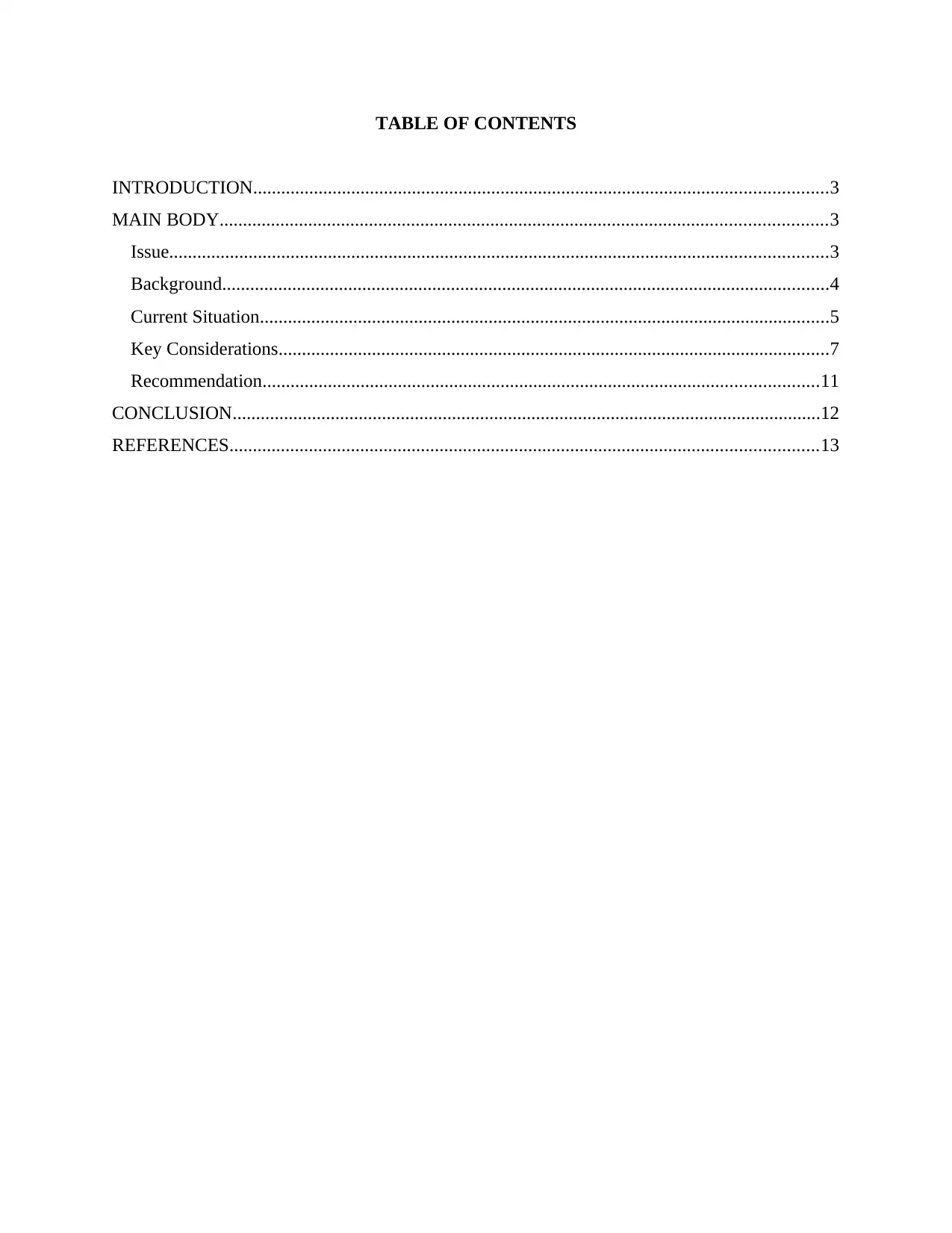
TABLE OF CONTENTS
INTRODUCTION...........................................................................................................................3
MAIN BODY..................................................................................................................................3
Issue.............................................................................................................................................3
Background..................................................................................................................................4
Current Situation..........................................................................................................................5
Key Considerations......................................................................................................................7
Recommendation.......................................................................................................................11
CONCLUSION..............................................................................................................................12
REFERENCES..............................................................................................................................13
INTRODUCTION...........................................................................................................................3
MAIN BODY..................................................................................................................................3
Issue.............................................................................................................................................3
Background..................................................................................................................................4
Current Situation..........................................................................................................................5
Key Considerations......................................................................................................................7
Recommendation.......................................................................................................................11
CONCLUSION..............................................................................................................................12
REFERENCES..............................................................................................................................13
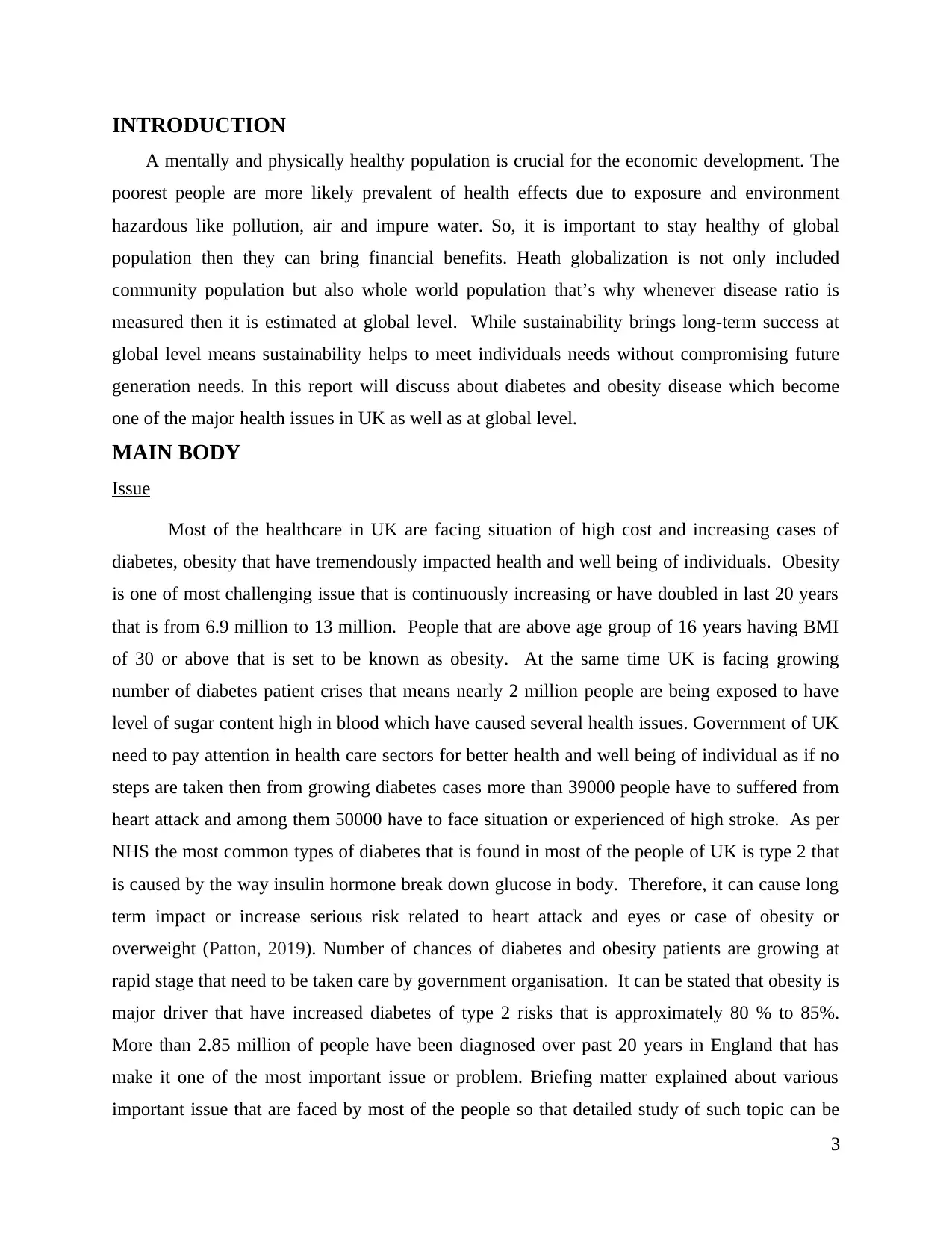
INTRODUCTION
A mentally and physically healthy population is crucial for the economic development. The
poorest people are more likely prevalent of health effects due to exposure and environment
hazardous like pollution, air and impure water. So, it is important to stay healthy of global
population then they can bring financial benefits. Heath globalization is not only included
community population but also whole world population that’s why whenever disease ratio is
measured then it is estimated at global level. While sustainability brings long-term success at
global level means sustainability helps to meet individuals needs without compromising future
generation needs. In this report will discuss about diabetes and obesity disease which become
one of the major health issues in UK as well as at global level.
MAIN BODY
Issue
Most of the healthcare in UK are facing situation of high cost and increasing cases of
diabetes, obesity that have tremendously impacted health and well being of individuals. Obesity
is one of most challenging issue that is continuously increasing or have doubled in last 20 years
that is from 6.9 million to 13 million. People that are above age group of 16 years having BMI
of 30 or above that is set to be known as obesity. At the same time UK is facing growing
number of diabetes patient crises that means nearly 2 million people are being exposed to have
level of sugar content high in blood which have caused several health issues. Government of UK
need to pay attention in health care sectors for better health and well being of individual as if no
steps are taken then from growing diabetes cases more than 39000 people have to suffered from
heart attack and among them 50000 have to face situation or experienced of high stroke. As per
NHS the most common types of diabetes that is found in most of the people of UK is type 2 that
is caused by the way insulin hormone break down glucose in body. Therefore, it can cause long
term impact or increase serious risk related to heart attack and eyes or case of obesity or
overweight (Patton, 2019). Number of chances of diabetes and obesity patients are growing at
rapid stage that need to be taken care by government organisation. It can be stated that obesity is
major driver that have increased diabetes of type 2 risks that is approximately 80 % to 85%.
More than 2.85 million of people have been diagnosed over past 20 years in England that has
make it one of the most important issue or problem. Briefing matter explained about various
important issue that are faced by most of the people so that detailed study of such topic can be
3
A mentally and physically healthy population is crucial for the economic development. The
poorest people are more likely prevalent of health effects due to exposure and environment
hazardous like pollution, air and impure water. So, it is important to stay healthy of global
population then they can bring financial benefits. Heath globalization is not only included
community population but also whole world population that’s why whenever disease ratio is
measured then it is estimated at global level. While sustainability brings long-term success at
global level means sustainability helps to meet individuals needs without compromising future
generation needs. In this report will discuss about diabetes and obesity disease which become
one of the major health issues in UK as well as at global level.
MAIN BODY
Issue
Most of the healthcare in UK are facing situation of high cost and increasing cases of
diabetes, obesity that have tremendously impacted health and well being of individuals. Obesity
is one of most challenging issue that is continuously increasing or have doubled in last 20 years
that is from 6.9 million to 13 million. People that are above age group of 16 years having BMI
of 30 or above that is set to be known as obesity. At the same time UK is facing growing
number of diabetes patient crises that means nearly 2 million people are being exposed to have
level of sugar content high in blood which have caused several health issues. Government of UK
need to pay attention in health care sectors for better health and well being of individual as if no
steps are taken then from growing diabetes cases more than 39000 people have to suffered from
heart attack and among them 50000 have to face situation or experienced of high stroke. As per
NHS the most common types of diabetes that is found in most of the people of UK is type 2 that
is caused by the way insulin hormone break down glucose in body. Therefore, it can cause long
term impact or increase serious risk related to heart attack and eyes or case of obesity or
overweight (Patton, 2019). Number of chances of diabetes and obesity patients are growing at
rapid stage that need to be taken care by government organisation. It can be stated that obesity is
major driver that have increased diabetes of type 2 risks that is approximately 80 % to 85%.
More than 2.85 million of people have been diagnosed over past 20 years in England that has
make it one of the most important issue or problem. Briefing matter explained about various
important issue that are faced by most of the people so that detailed study of such topic can be
3
⊘ This is a preview!⊘
Do you want full access?
Subscribe today to unlock all pages.

Trusted by 1+ million students worldwide
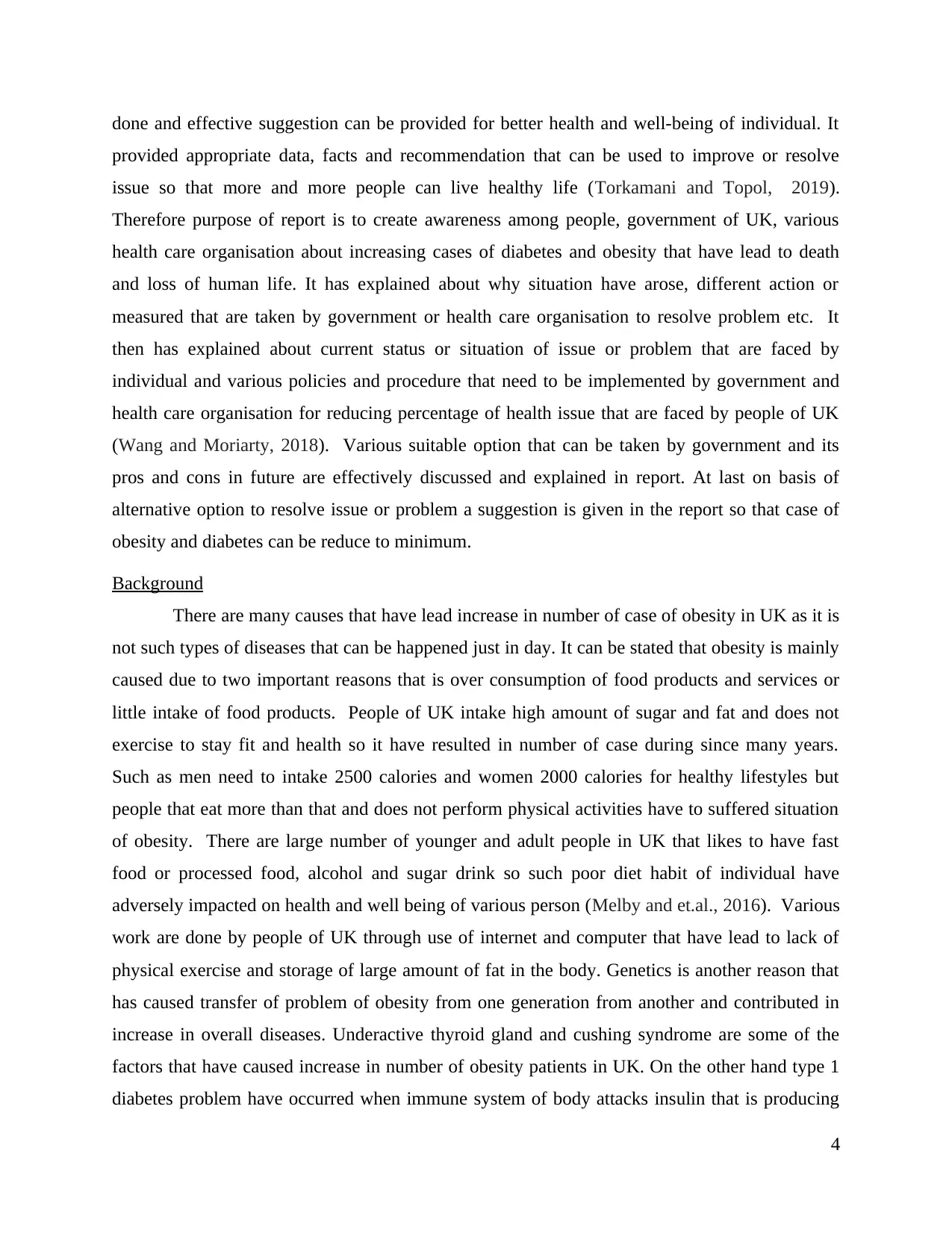
done and effective suggestion can be provided for better health and well-being of individual. It
provided appropriate data, facts and recommendation that can be used to improve or resolve
issue so that more and more people can live healthy life (Torkamani and Topol, 2019).
Therefore purpose of report is to create awareness among people, government of UK, various
health care organisation about increasing cases of diabetes and obesity that have lead to death
and loss of human life. It has explained about why situation have arose, different action or
measured that are taken by government or health care organisation to resolve problem etc. It
then has explained about current status or situation of issue or problem that are faced by
individual and various policies and procedure that need to be implemented by government and
health care organisation for reducing percentage of health issue that are faced by people of UK
(Wang and Moriarty, 2018). Various suitable option that can be taken by government and its
pros and cons in future are effectively discussed and explained in report. At last on basis of
alternative option to resolve issue or problem a suggestion is given in the report so that case of
obesity and diabetes can be reduce to minimum.
Background
There are many causes that have lead increase in number of case of obesity in UK as it is
not such types of diseases that can be happened just in day. It can be stated that obesity is mainly
caused due to two important reasons that is over consumption of food products and services or
little intake of food products. People of UK intake high amount of sugar and fat and does not
exercise to stay fit and health so it have resulted in number of case during since many years.
Such as men need to intake 2500 calories and women 2000 calories for healthy lifestyles but
people that eat more than that and does not perform physical activities have to suffered situation
of obesity. There are large number of younger and adult people in UK that likes to have fast
food or processed food, alcohol and sugar drink so such poor diet habit of individual have
adversely impacted on health and well being of various person (Melby and et.al., 2016). Various
work are done by people of UK through use of internet and computer that have lead to lack of
physical exercise and storage of large amount of fat in the body. Genetics is another reason that
has caused transfer of problem of obesity from one generation from another and contributed in
increase in overall diseases. Underactive thyroid gland and cushing syndrome are some of the
factors that have caused increase in number of obesity patients in UK. On the other hand type 1
diabetes problem have occurred when immune system of body attacks insulin that is producing
4
provided appropriate data, facts and recommendation that can be used to improve or resolve
issue so that more and more people can live healthy life (Torkamani and Topol, 2019).
Therefore purpose of report is to create awareness among people, government of UK, various
health care organisation about increasing cases of diabetes and obesity that have lead to death
and loss of human life. It has explained about why situation have arose, different action or
measured that are taken by government or health care organisation to resolve problem etc. It
then has explained about current status or situation of issue or problem that are faced by
individual and various policies and procedure that need to be implemented by government and
health care organisation for reducing percentage of health issue that are faced by people of UK
(Wang and Moriarty, 2018). Various suitable option that can be taken by government and its
pros and cons in future are effectively discussed and explained in report. At last on basis of
alternative option to resolve issue or problem a suggestion is given in the report so that case of
obesity and diabetes can be reduce to minimum.
Background
There are many causes that have lead increase in number of case of obesity in UK as it is
not such types of diseases that can be happened just in day. It can be stated that obesity is mainly
caused due to two important reasons that is over consumption of food products and services or
little intake of food products. People of UK intake high amount of sugar and fat and does not
exercise to stay fit and health so it have resulted in number of case during since many years.
Such as men need to intake 2500 calories and women 2000 calories for healthy lifestyles but
people that eat more than that and does not perform physical activities have to suffered situation
of obesity. There are large number of younger and adult people in UK that likes to have fast
food or processed food, alcohol and sugar drink so such poor diet habit of individual have
adversely impacted on health and well being of various person (Melby and et.al., 2016). Various
work are done by people of UK through use of internet and computer that have lead to lack of
physical exercise and storage of large amount of fat in the body. Genetics is another reason that
has caused transfer of problem of obesity from one generation from another and contributed in
increase in overall diseases. Underactive thyroid gland and cushing syndrome are some of the
factors that have caused increase in number of obesity patients in UK. On the other hand type 1
diabetes problem have occurred when immune system of body attacks insulin that is producing
4
Paraphrase This Document
Need a fresh take? Get an instant paraphrase of this document with our AI Paraphraser
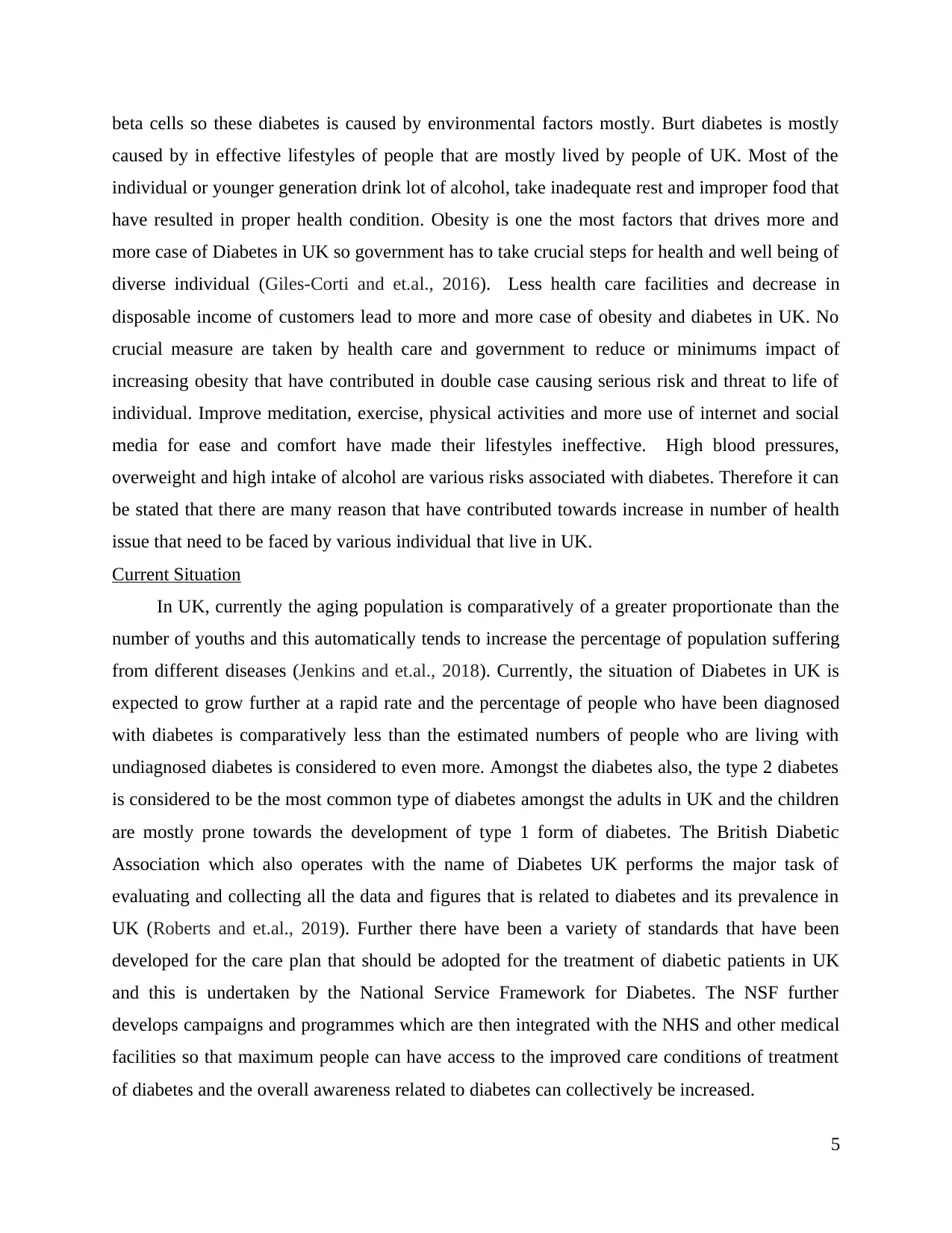
beta cells so these diabetes is caused by environmental factors mostly. Burt diabetes is mostly
caused by in effective lifestyles of people that are mostly lived by people of UK. Most of the
individual or younger generation drink lot of alcohol, take inadequate rest and improper food that
have resulted in proper health condition. Obesity is one the most factors that drives more and
more case of Diabetes in UK so government has to take crucial steps for health and well being of
diverse individual (Giles-Corti and et.al., 2016). Less health care facilities and decrease in
disposable income of customers lead to more and more case of obesity and diabetes in UK. No
crucial measure are taken by health care and government to reduce or minimums impact of
increasing obesity that have contributed in double case causing serious risk and threat to life of
individual. Improve meditation, exercise, physical activities and more use of internet and social
media for ease and comfort have made their lifestyles ineffective. High blood pressures,
overweight and high intake of alcohol are various risks associated with diabetes. Therefore it can
be stated that there are many reason that have contributed towards increase in number of health
issue that need to be faced by various individual that live in UK.
Current Situation
In UK, currently the aging population is comparatively of a greater proportionate than the
number of youths and this automatically tends to increase the percentage of population suffering
from different diseases (Jenkins and et.al., 2018). Currently, the situation of Diabetes in UK is
expected to grow further at a rapid rate and the percentage of people who have been diagnosed
with diabetes is comparatively less than the estimated numbers of people who are living with
undiagnosed diabetes is considered to even more. Amongst the diabetes also, the type 2 diabetes
is considered to be the most common type of diabetes amongst the adults in UK and the children
are mostly prone towards the development of type 1 form of diabetes. The British Diabetic
Association which also operates with the name of Diabetes UK performs the major task of
evaluating and collecting all the data and figures that is related to diabetes and its prevalence in
UK (Roberts and et.al., 2019). Further there have been a variety of standards that have been
developed for the care plan that should be adopted for the treatment of diabetic patients in UK
and this is undertaken by the National Service Framework for Diabetes. The NSF further
develops campaigns and programmes which are then integrated with the NHS and other medical
facilities so that maximum people can have access to the improved care conditions of treatment
of diabetes and the overall awareness related to diabetes can collectively be increased.
5
caused by in effective lifestyles of people that are mostly lived by people of UK. Most of the
individual or younger generation drink lot of alcohol, take inadequate rest and improper food that
have resulted in proper health condition. Obesity is one the most factors that drives more and
more case of Diabetes in UK so government has to take crucial steps for health and well being of
diverse individual (Giles-Corti and et.al., 2016). Less health care facilities and decrease in
disposable income of customers lead to more and more case of obesity and diabetes in UK. No
crucial measure are taken by health care and government to reduce or minimums impact of
increasing obesity that have contributed in double case causing serious risk and threat to life of
individual. Improve meditation, exercise, physical activities and more use of internet and social
media for ease and comfort have made their lifestyles ineffective. High blood pressures,
overweight and high intake of alcohol are various risks associated with diabetes. Therefore it can
be stated that there are many reason that have contributed towards increase in number of health
issue that need to be faced by various individual that live in UK.
Current Situation
In UK, currently the aging population is comparatively of a greater proportionate than the
number of youths and this automatically tends to increase the percentage of population suffering
from different diseases (Jenkins and et.al., 2018). Currently, the situation of Diabetes in UK is
expected to grow further at a rapid rate and the percentage of people who have been diagnosed
with diabetes is comparatively less than the estimated numbers of people who are living with
undiagnosed diabetes is considered to even more. Amongst the diabetes also, the type 2 diabetes
is considered to be the most common type of diabetes amongst the adults in UK and the children
are mostly prone towards the development of type 1 form of diabetes. The British Diabetic
Association which also operates with the name of Diabetes UK performs the major task of
evaluating and collecting all the data and figures that is related to diabetes and its prevalence in
UK (Roberts and et.al., 2019). Further there have been a variety of standards that have been
developed for the care plan that should be adopted for the treatment of diabetic patients in UK
and this is undertaken by the National Service Framework for Diabetes. The NSF further
develops campaigns and programmes which are then integrated with the NHS and other medical
facilities so that maximum people can have access to the improved care conditions of treatment
of diabetes and the overall awareness related to diabetes can collectively be increased.
5
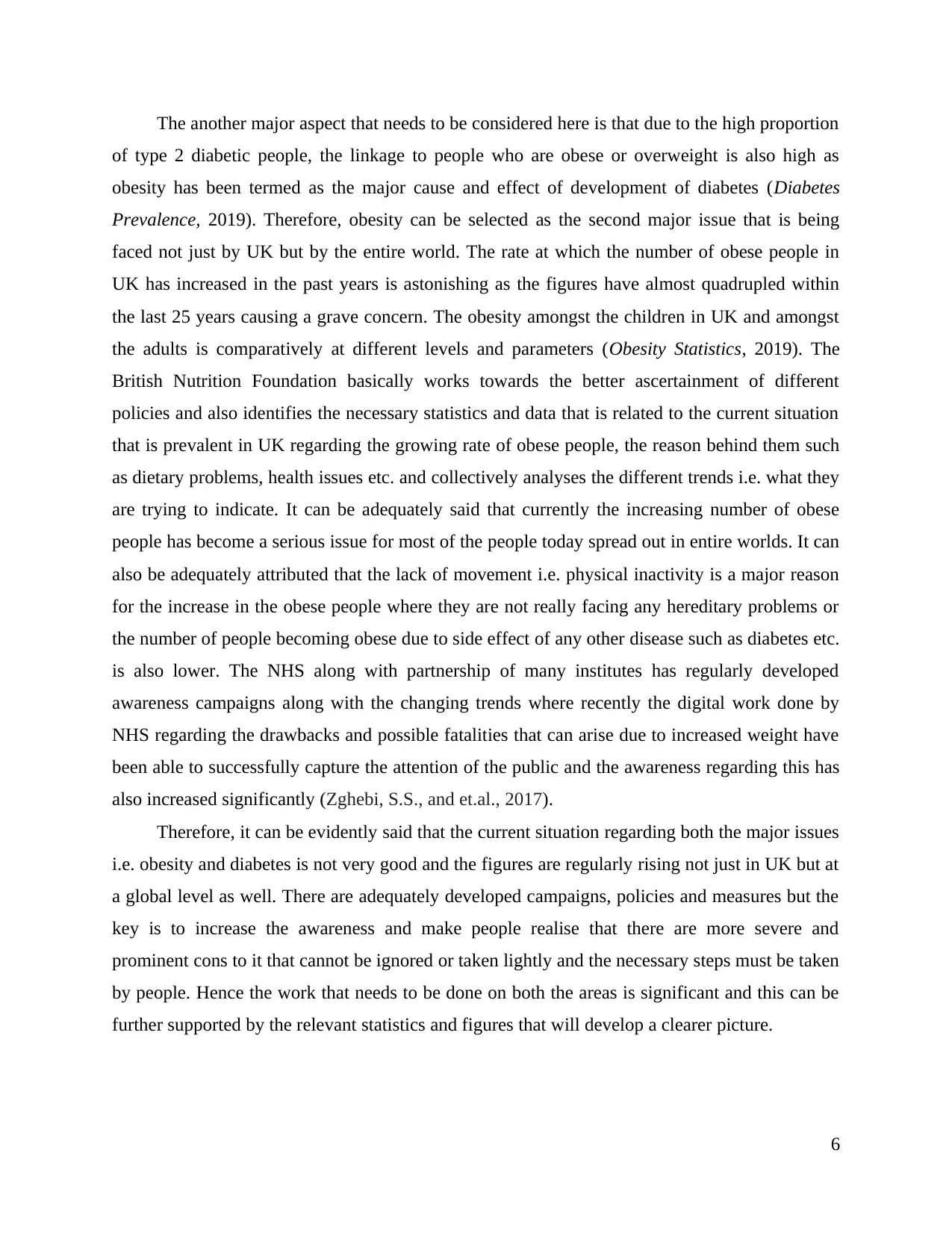
The another major aspect that needs to be considered here is that due to the high proportion
of type 2 diabetic people, the linkage to people who are obese or overweight is also high as
obesity has been termed as the major cause and effect of development of diabetes (Diabetes
Prevalence, 2019). Therefore, obesity can be selected as the second major issue that is being
faced not just by UK but by the entire world. The rate at which the number of obese people in
UK has increased in the past years is astonishing as the figures have almost quadrupled within
the last 25 years causing a grave concern. The obesity amongst the children in UK and amongst
the adults is comparatively at different levels and parameters (Obesity Statistics, 2019). The
British Nutrition Foundation basically works towards the better ascertainment of different
policies and also identifies the necessary statistics and data that is related to the current situation
that is prevalent in UK regarding the growing rate of obese people, the reason behind them such
as dietary problems, health issues etc. and collectively analyses the different trends i.e. what they
are trying to indicate. It can be adequately said that currently the increasing number of obese
people has become a serious issue for most of the people today spread out in entire worlds. It can
also be adequately attributed that the lack of movement i.e. physical inactivity is a major reason
for the increase in the obese people where they are not really facing any hereditary problems or
the number of people becoming obese due to side effect of any other disease such as diabetes etc.
is also lower. The NHS along with partnership of many institutes has regularly developed
awareness campaigns along with the changing trends where recently the digital work done by
NHS regarding the drawbacks and possible fatalities that can arise due to increased weight have
been able to successfully capture the attention of the public and the awareness regarding this has
also increased significantly (Zghebi, S.S., and et.al., 2017).
Therefore, it can be evidently said that the current situation regarding both the major issues
i.e. obesity and diabetes is not very good and the figures are regularly rising not just in UK but at
a global level as well. There are adequately developed campaigns, policies and measures but the
key is to increase the awareness and make people realise that there are more severe and
prominent cons to it that cannot be ignored or taken lightly and the necessary steps must be taken
by people. Hence the work that needs to be done on both the areas is significant and this can be
further supported by the relevant statistics and figures that will develop a clearer picture.
6
of type 2 diabetic people, the linkage to people who are obese or overweight is also high as
obesity has been termed as the major cause and effect of development of diabetes (Diabetes
Prevalence, 2019). Therefore, obesity can be selected as the second major issue that is being
faced not just by UK but by the entire world. The rate at which the number of obese people in
UK has increased in the past years is astonishing as the figures have almost quadrupled within
the last 25 years causing a grave concern. The obesity amongst the children in UK and amongst
the adults is comparatively at different levels and parameters (Obesity Statistics, 2019). The
British Nutrition Foundation basically works towards the better ascertainment of different
policies and also identifies the necessary statistics and data that is related to the current situation
that is prevalent in UK regarding the growing rate of obese people, the reason behind them such
as dietary problems, health issues etc. and collectively analyses the different trends i.e. what they
are trying to indicate. It can be adequately said that currently the increasing number of obese
people has become a serious issue for most of the people today spread out in entire worlds. It can
also be adequately attributed that the lack of movement i.e. physical inactivity is a major reason
for the increase in the obese people where they are not really facing any hereditary problems or
the number of people becoming obese due to side effect of any other disease such as diabetes etc.
is also lower. The NHS along with partnership of many institutes has regularly developed
awareness campaigns along with the changing trends where recently the digital work done by
NHS regarding the drawbacks and possible fatalities that can arise due to increased weight have
been able to successfully capture the attention of the public and the awareness regarding this has
also increased significantly (Zghebi, S.S., and et.al., 2017).
Therefore, it can be evidently said that the current situation regarding both the major issues
i.e. obesity and diabetes is not very good and the figures are regularly rising not just in UK but at
a global level as well. There are adequately developed campaigns, policies and measures but the
key is to increase the awareness and make people realise that there are more severe and
prominent cons to it that cannot be ignored or taken lightly and the necessary steps must be taken
by people. Hence the work that needs to be done on both the areas is significant and this can be
further supported by the relevant statistics and figures that will develop a clearer picture.
6
⊘ This is a preview!⊘
Do you want full access?
Subscribe today to unlock all pages.

Trusted by 1+ million students worldwide
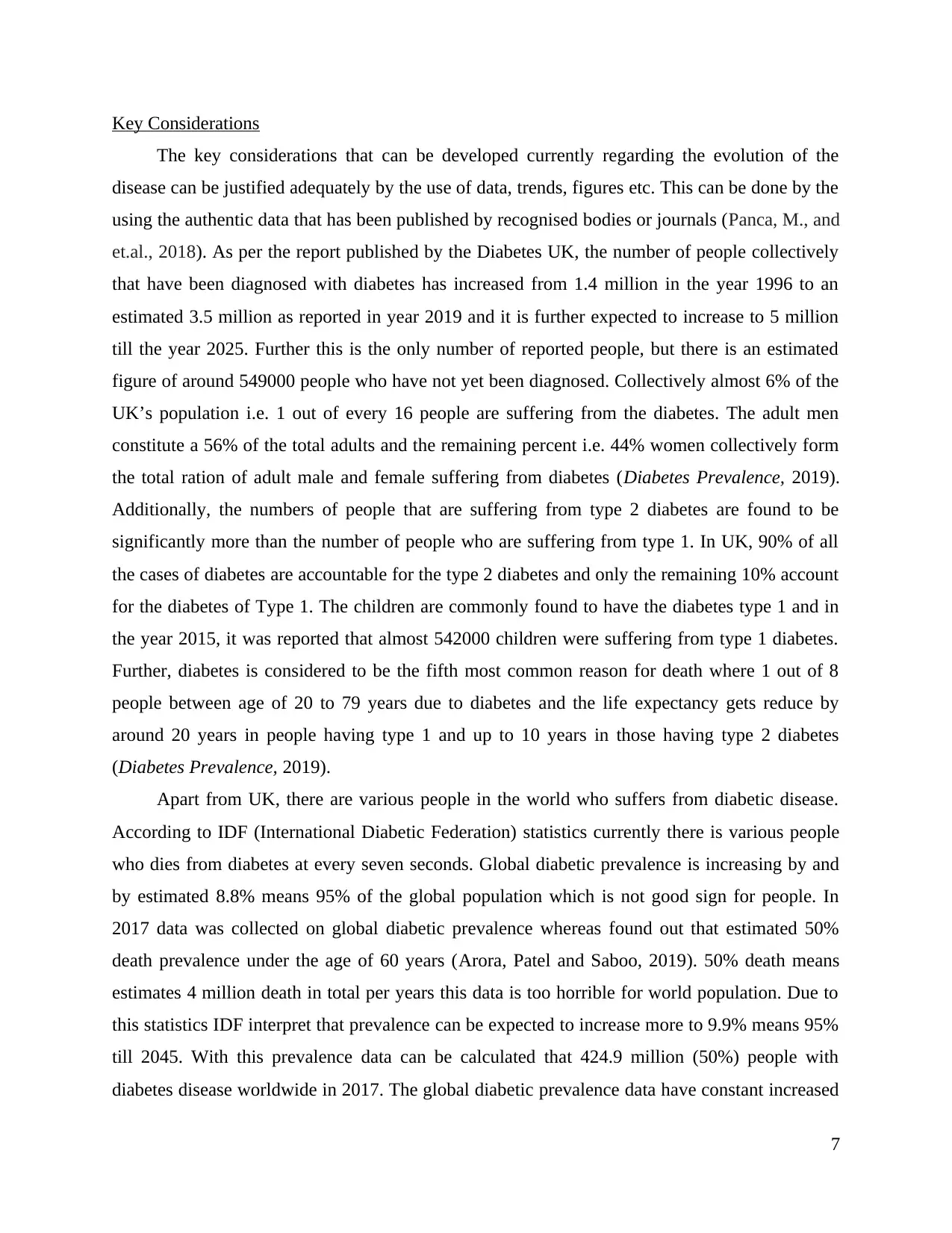
Key Considerations
The key considerations that can be developed currently regarding the evolution of the
disease can be justified adequately by the use of data, trends, figures etc. This can be done by the
using the authentic data that has been published by recognised bodies or journals (Panca, M., and
et.al., 2018). As per the report published by the Diabetes UK, the number of people collectively
that have been diagnosed with diabetes has increased from 1.4 million in the year 1996 to an
estimated 3.5 million as reported in year 2019 and it is further expected to increase to 5 million
till the year 2025. Further this is the only number of reported people, but there is an estimated
figure of around 549000 people who have not yet been diagnosed. Collectively almost 6% of the
UK’s population i.e. 1 out of every 16 people are suffering from the diabetes. The adult men
constitute a 56% of the total adults and the remaining percent i.e. 44% women collectively form
the total ration of adult male and female suffering from diabetes (Diabetes Prevalence, 2019).
Additionally, the numbers of people that are suffering from type 2 diabetes are found to be
significantly more than the number of people who are suffering from type 1. In UK, 90% of all
the cases of diabetes are accountable for the type 2 diabetes and only the remaining 10% account
for the diabetes of Type 1. The children are commonly found to have the diabetes type 1 and in
the year 2015, it was reported that almost 542000 children were suffering from type 1 diabetes.
Further, diabetes is considered to be the fifth most common reason for death where 1 out of 8
people between age of 20 to 79 years due to diabetes and the life expectancy gets reduce by
around 20 years in people having type 1 and up to 10 years in those having type 2 diabetes
(Diabetes Prevalence, 2019).
Apart from UK, there are various people in the world who suffers from diabetic disease.
According to IDF (International Diabetic Federation) statistics currently there is various people
who dies from diabetes at every seven seconds. Global diabetic prevalence is increasing by and
by estimated 8.8% means 95% of the global population which is not good sign for people. In
2017 data was collected on global diabetic prevalence whereas found out that estimated 50%
death prevalence under the age of 60 years (Arora, Patel and Saboo, 2019). 50% death means
estimates 4 million death in total per years this data is too horrible for world population. Due to
this statistics IDF interpret that prevalence can be expected to increase more to 9.9% means 95%
till 2045. With this prevalence data can be calculated that 424.9 million (50%) people with
diabetes disease worldwide in 2017. The global diabetic prevalence data have constant increased
7
The key considerations that can be developed currently regarding the evolution of the
disease can be justified adequately by the use of data, trends, figures etc. This can be done by the
using the authentic data that has been published by recognised bodies or journals (Panca, M., and
et.al., 2018). As per the report published by the Diabetes UK, the number of people collectively
that have been diagnosed with diabetes has increased from 1.4 million in the year 1996 to an
estimated 3.5 million as reported in year 2019 and it is further expected to increase to 5 million
till the year 2025. Further this is the only number of reported people, but there is an estimated
figure of around 549000 people who have not yet been diagnosed. Collectively almost 6% of the
UK’s population i.e. 1 out of every 16 people are suffering from the diabetes. The adult men
constitute a 56% of the total adults and the remaining percent i.e. 44% women collectively form
the total ration of adult male and female suffering from diabetes (Diabetes Prevalence, 2019).
Additionally, the numbers of people that are suffering from type 2 diabetes are found to be
significantly more than the number of people who are suffering from type 1. In UK, 90% of all
the cases of diabetes are accountable for the type 2 diabetes and only the remaining 10% account
for the diabetes of Type 1. The children are commonly found to have the diabetes type 1 and in
the year 2015, it was reported that almost 542000 children were suffering from type 1 diabetes.
Further, diabetes is considered to be the fifth most common reason for death where 1 out of 8
people between age of 20 to 79 years due to diabetes and the life expectancy gets reduce by
around 20 years in people having type 1 and up to 10 years in those having type 2 diabetes
(Diabetes Prevalence, 2019).
Apart from UK, there are various people in the world who suffers from diabetic disease.
According to IDF (International Diabetic Federation) statistics currently there is various people
who dies from diabetes at every seven seconds. Global diabetic prevalence is increasing by and
by estimated 8.8% means 95% of the global population which is not good sign for people. In
2017 data was collected on global diabetic prevalence whereas found out that estimated 50%
death prevalence under the age of 60 years (Arora, Patel and Saboo, 2019). 50% death means
estimates 4 million death in total per years this data is too horrible for world population. Due to
this statistics IDF interpret that prevalence can be expected to increase more to 9.9% means 95%
till 2045. With this prevalence data can be calculated that 424.9 million (50%) people with
diabetes disease worldwide in 2017. The global diabetic prevalence data have constant increased
7
Paraphrase This Document
Need a fresh take? Get an instant paraphrase of this document with our AI Paraphraser
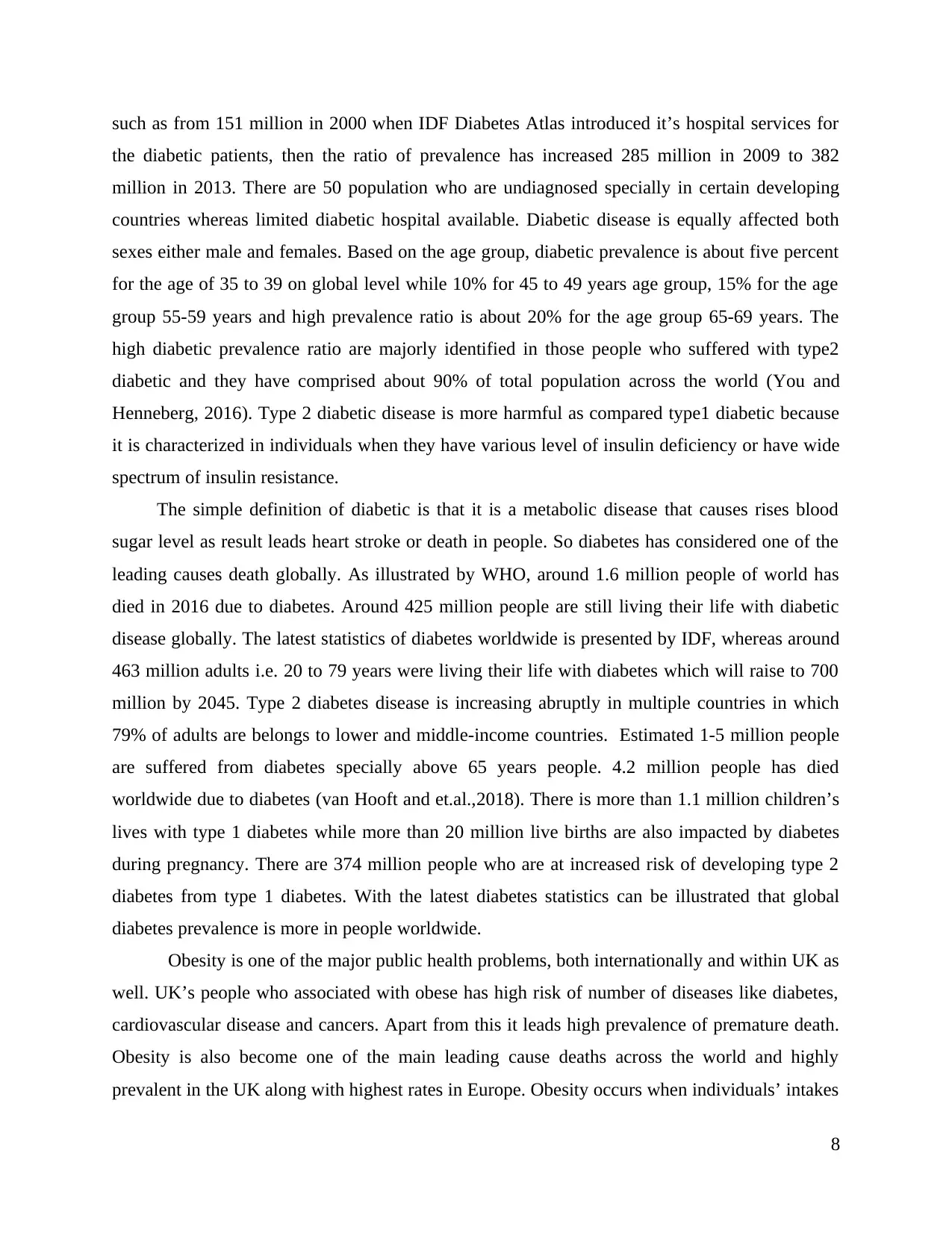
such as from 151 million in 2000 when IDF Diabetes Atlas introduced it’s hospital services for
the diabetic patients, then the ratio of prevalence has increased 285 million in 2009 to 382
million in 2013. There are 50 population who are undiagnosed specially in certain developing
countries whereas limited diabetic hospital available. Diabetic disease is equally affected both
sexes either male and females. Based on the age group, diabetic prevalence is about five percent
for the age of 35 to 39 on global level while 10% for 45 to 49 years age group, 15% for the age
group 55-59 years and high prevalence ratio is about 20% for the age group 65-69 years. The
high diabetic prevalence ratio are majorly identified in those people who suffered with type2
diabetic and they have comprised about 90% of total population across the world (You and
Henneberg, 2016). Type 2 diabetic disease is more harmful as compared type1 diabetic because
it is characterized in individuals when they have various level of insulin deficiency or have wide
spectrum of insulin resistance.
The simple definition of diabetic is that it is a metabolic disease that causes rises blood
sugar level as result leads heart stroke or death in people. So diabetes has considered one of the
leading causes death globally. As illustrated by WHO, around 1.6 million people of world has
died in 2016 due to diabetes. Around 425 million people are still living their life with diabetic
disease globally. The latest statistics of diabetes worldwide is presented by IDF, whereas around
463 million adults i.e. 20 to 79 years were living their life with diabetes which will raise to 700
million by 2045. Type 2 diabetes disease is increasing abruptly in multiple countries in which
79% of adults are belongs to lower and middle-income countries. Estimated 1-5 million people
are suffered from diabetes specially above 65 years people. 4.2 million people has died
worldwide due to diabetes (van Hooft and et.al.,2018). There is more than 1.1 million children’s
lives with type 1 diabetes while more than 20 million live births are also impacted by diabetes
during pregnancy. There are 374 million people who are at increased risk of developing type 2
diabetes from type 1 diabetes. With the latest diabetes statistics can be illustrated that global
diabetes prevalence is more in people worldwide.
Obesity is one of the major public health problems, both internationally and within UK as
well. UK’s people who associated with obese has high risk of number of diseases like diabetes,
cardiovascular disease and cancers. Apart from this it leads high prevalence of premature death.
Obesity is also become one of the main leading cause deaths across the world and highly
prevalent in the UK along with highest rates in Europe. Obesity occurs when individuals’ intakes
8
the diabetic patients, then the ratio of prevalence has increased 285 million in 2009 to 382
million in 2013. There are 50 population who are undiagnosed specially in certain developing
countries whereas limited diabetic hospital available. Diabetic disease is equally affected both
sexes either male and females. Based on the age group, diabetic prevalence is about five percent
for the age of 35 to 39 on global level while 10% for 45 to 49 years age group, 15% for the age
group 55-59 years and high prevalence ratio is about 20% for the age group 65-69 years. The
high diabetic prevalence ratio are majorly identified in those people who suffered with type2
diabetic and they have comprised about 90% of total population across the world (You and
Henneberg, 2016). Type 2 diabetic disease is more harmful as compared type1 diabetic because
it is characterized in individuals when they have various level of insulin deficiency or have wide
spectrum of insulin resistance.
The simple definition of diabetic is that it is a metabolic disease that causes rises blood
sugar level as result leads heart stroke or death in people. So diabetes has considered one of the
leading causes death globally. As illustrated by WHO, around 1.6 million people of world has
died in 2016 due to diabetes. Around 425 million people are still living their life with diabetic
disease globally. The latest statistics of diabetes worldwide is presented by IDF, whereas around
463 million adults i.e. 20 to 79 years were living their life with diabetes which will raise to 700
million by 2045. Type 2 diabetes disease is increasing abruptly in multiple countries in which
79% of adults are belongs to lower and middle-income countries. Estimated 1-5 million people
are suffered from diabetes specially above 65 years people. 4.2 million people has died
worldwide due to diabetes (van Hooft and et.al.,2018). There is more than 1.1 million children’s
lives with type 1 diabetes while more than 20 million live births are also impacted by diabetes
during pregnancy. There are 374 million people who are at increased risk of developing type 2
diabetes from type 1 diabetes. With the latest diabetes statistics can be illustrated that global
diabetes prevalence is more in people worldwide.
Obesity is one of the major public health problems, both internationally and within UK as
well. UK’s people who associated with obese has high risk of number of diseases like diabetes,
cardiovascular disease and cancers. Apart from this it leads high prevalence of premature death.
Obesity is also become one of the main leading cause deaths across the world and highly
prevalent in the UK along with highest rates in Europe. Obesity occurs when individuals’ intakes
8
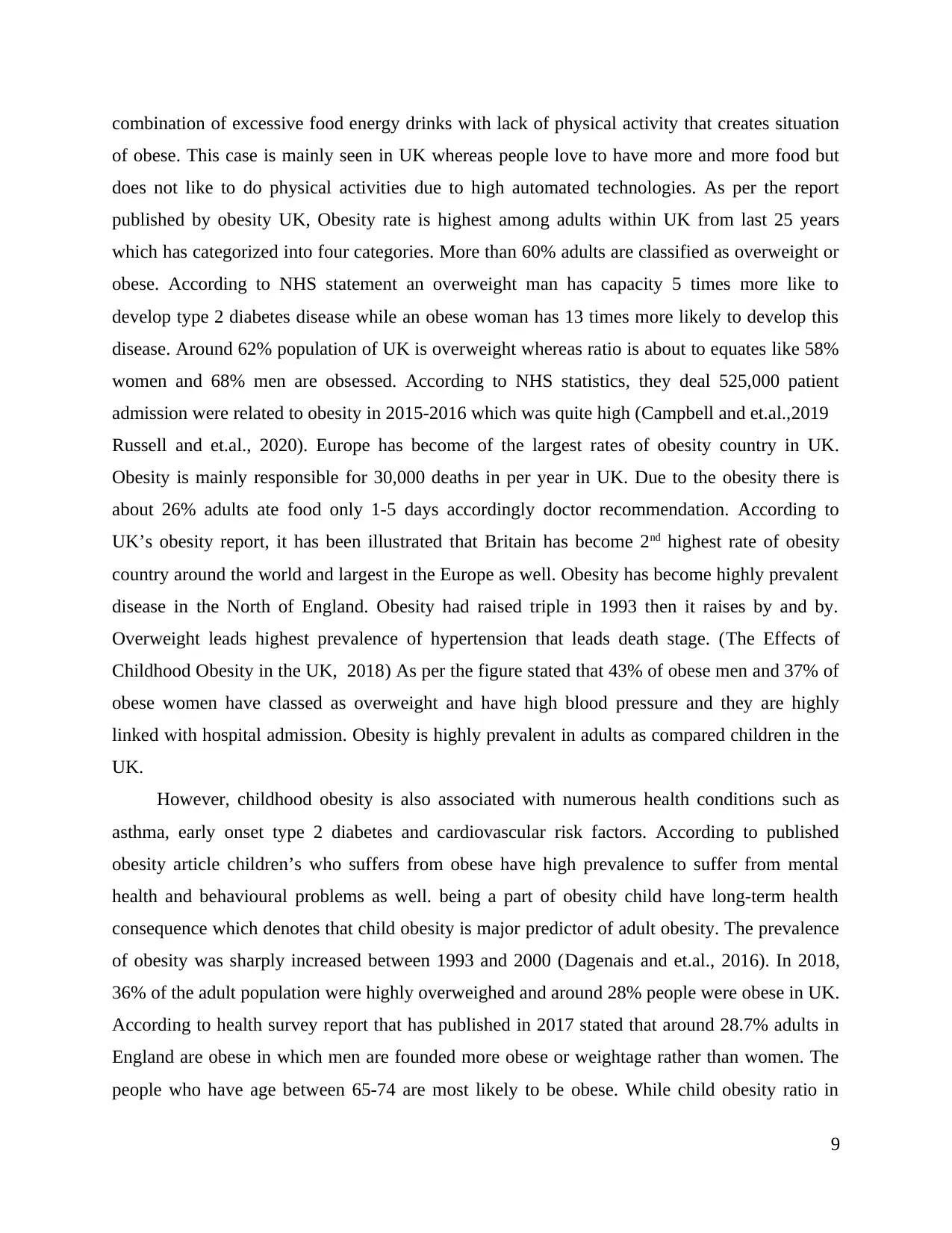
combination of excessive food energy drinks with lack of physical activity that creates situation
of obese. This case is mainly seen in UK whereas people love to have more and more food but
does not like to do physical activities due to high automated technologies. As per the report
published by obesity UK, Obesity rate is highest among adults within UK from last 25 years
which has categorized into four categories. More than 60% adults are classified as overweight or
obese. According to NHS statement an overweight man has capacity 5 times more like to
develop type 2 diabetes disease while an obese woman has 13 times more likely to develop this
disease. Around 62% population of UK is overweight whereas ratio is about to equates like 58%
women and 68% men are obsessed. According to NHS statistics, they deal 525,000 patient
admission were related to obesity in 2015-2016 which was quite high (Campbell and et.al.,2019
Russell and et.al., 2020). Europe has become of the largest rates of obesity country in UK.
Obesity is mainly responsible for 30,000 deaths in per year in UK. Due to the obesity there is
about 26% adults ate food only 1-5 days accordingly doctor recommendation. According to
UK’s obesity report, it has been illustrated that Britain has become 2nd highest rate of obesity
country around the world and largest in the Europe as well. Obesity has become highly prevalent
disease in the North of England. Obesity had raised triple in 1993 then it raises by and by.
Overweight leads highest prevalence of hypertension that leads death stage. (The Effects of
Childhood Obesity in the UK, 2018) As per the figure stated that 43% of obese men and 37% of
obese women have classed as overweight and have high blood pressure and they are highly
linked with hospital admission. Obesity is highly prevalent in adults as compared children in the
UK.
However, childhood obesity is also associated with numerous health conditions such as
asthma, early onset type 2 diabetes and cardiovascular risk factors. According to published
obesity article children’s who suffers from obese have high prevalence to suffer from mental
health and behavioural problems as well. being a part of obesity child have long-term health
consequence which denotes that child obesity is major predictor of adult obesity. The prevalence
of obesity was sharply increased between 1993 and 2000 (Dagenais and et.al., 2016). In 2018,
36% of the adult population were highly overweighed and around 28% people were obese in UK.
According to health survey report that has published in 2017 stated that around 28.7% adults in
England are obese in which men are founded more obese or weightage rather than women. The
people who have age between 65-74 are most likely to be obese. While child obesity ratio in
9
of obese. This case is mainly seen in UK whereas people love to have more and more food but
does not like to do physical activities due to high automated technologies. As per the report
published by obesity UK, Obesity rate is highest among adults within UK from last 25 years
which has categorized into four categories. More than 60% adults are classified as overweight or
obese. According to NHS statement an overweight man has capacity 5 times more like to
develop type 2 diabetes disease while an obese woman has 13 times more likely to develop this
disease. Around 62% population of UK is overweight whereas ratio is about to equates like 58%
women and 68% men are obsessed. According to NHS statistics, they deal 525,000 patient
admission were related to obesity in 2015-2016 which was quite high (Campbell and et.al.,2019
Russell and et.al., 2020). Europe has become of the largest rates of obesity country in UK.
Obesity is mainly responsible for 30,000 deaths in per year in UK. Due to the obesity there is
about 26% adults ate food only 1-5 days accordingly doctor recommendation. According to
UK’s obesity report, it has been illustrated that Britain has become 2nd highest rate of obesity
country around the world and largest in the Europe as well. Obesity has become highly prevalent
disease in the North of England. Obesity had raised triple in 1993 then it raises by and by.
Overweight leads highest prevalence of hypertension that leads death stage. (The Effects of
Childhood Obesity in the UK, 2018) As per the figure stated that 43% of obese men and 37% of
obese women have classed as overweight and have high blood pressure and they are highly
linked with hospital admission. Obesity is highly prevalent in adults as compared children in the
UK.
However, childhood obesity is also associated with numerous health conditions such as
asthma, early onset type 2 diabetes and cardiovascular risk factors. According to published
obesity article children’s who suffers from obese have high prevalence to suffer from mental
health and behavioural problems as well. being a part of obesity child have long-term health
consequence which denotes that child obesity is major predictor of adult obesity. The prevalence
of obesity was sharply increased between 1993 and 2000 (Dagenais and et.al., 2016). In 2018,
36% of the adult population were highly overweighed and around 28% people were obese in UK.
According to health survey report that has published in 2017 stated that around 28.7% adults in
England are obese in which men are founded more obese or weightage rather than women. The
people who have age between 65-74 are most likely to be obese. While child obesity ratio in
9
⊘ This is a preview!⊘
Do you want full access?
Subscribe today to unlock all pages.

Trusted by 1+ million students worldwide
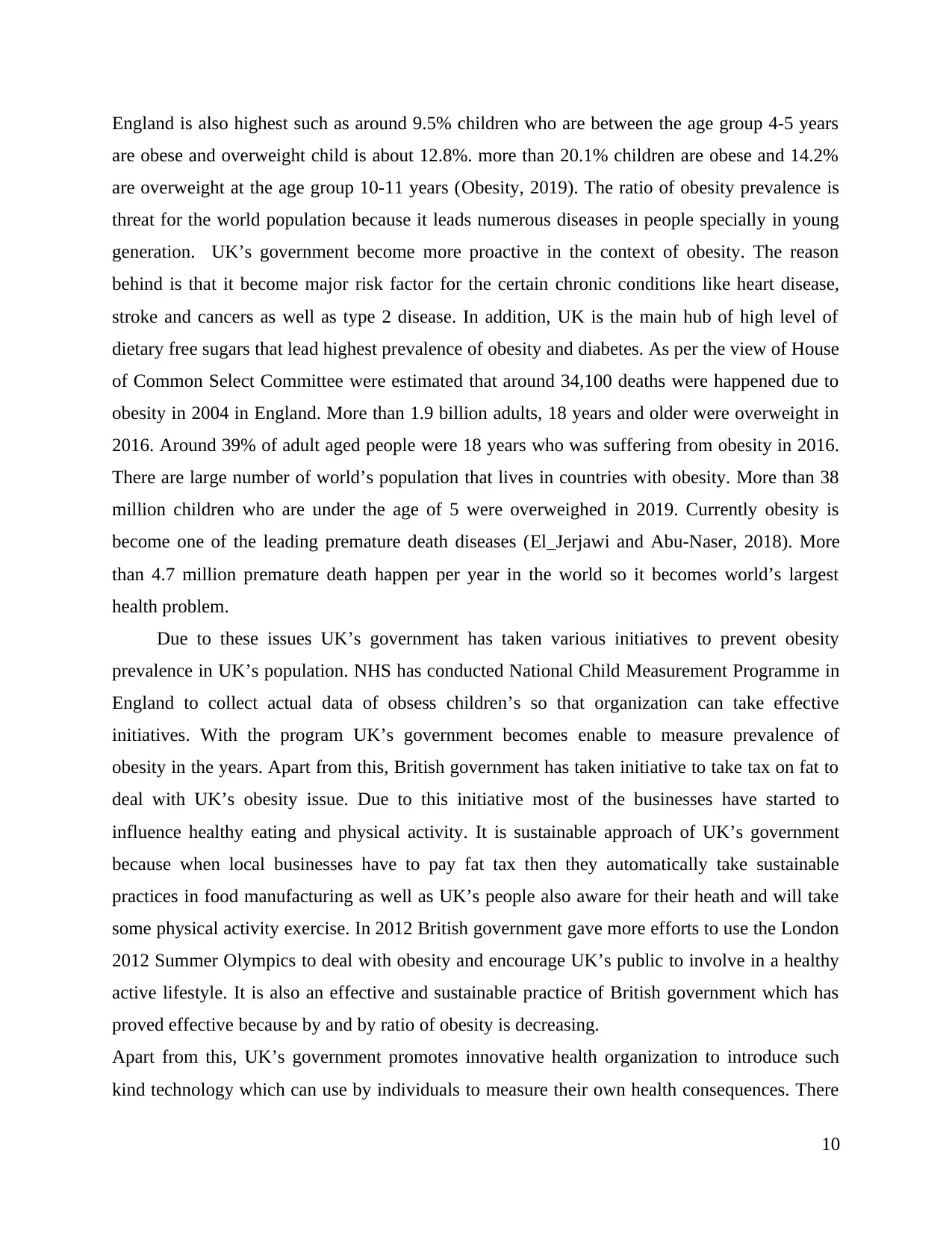
England is also highest such as around 9.5% children who are between the age group 4-5 years
are obese and overweight child is about 12.8%. more than 20.1% children are obese and 14.2%
are overweight at the age group 10-11 years (Obesity, 2019). The ratio of obesity prevalence is
threat for the world population because it leads numerous diseases in people specially in young
generation. UK’s government become more proactive in the context of obesity. The reason
behind is that it become major risk factor for the certain chronic conditions like heart disease,
stroke and cancers as well as type 2 disease. In addition, UK is the main hub of high level of
dietary free sugars that lead highest prevalence of obesity and diabetes. As per the view of House
of Common Select Committee were estimated that around 34,100 deaths were happened due to
obesity in 2004 in England. More than 1.9 billion adults, 18 years and older were overweight in
2016. Around 39% of adult aged people were 18 years who was suffering from obesity in 2016.
There are large number of world’s population that lives in countries with obesity. More than 38
million children who are under the age of 5 were overweighed in 2019. Currently obesity is
become one of the leading premature death diseases (El_Jerjawi and Abu-Naser, 2018). More
than 4.7 million premature death happen per year in the world so it becomes world’s largest
health problem.
Due to these issues UK’s government has taken various initiatives to prevent obesity
prevalence in UK’s population. NHS has conducted National Child Measurement Programme in
England to collect actual data of obsess children’s so that organization can take effective
initiatives. With the program UK’s government becomes enable to measure prevalence of
obesity in the years. Apart from this, British government has taken initiative to take tax on fat to
deal with UK’s obesity issue. Due to this initiative most of the businesses have started to
influence healthy eating and physical activity. It is sustainable approach of UK’s government
because when local businesses have to pay fat tax then they automatically take sustainable
practices in food manufacturing as well as UK’s people also aware for their heath and will take
some physical activity exercise. In 2012 British government gave more efforts to use the London
2012 Summer Olympics to deal with obesity and encourage UK’s public to involve in a healthy
active lifestyle. It is also an effective and sustainable practice of British government which has
proved effective because by and by ratio of obesity is decreasing.
Apart from this, UK’s government promotes innovative health organization to introduce such
kind technology which can use by individuals to measure their own health consequences. There
10
are obese and overweight child is about 12.8%. more than 20.1% children are obese and 14.2%
are overweight at the age group 10-11 years (Obesity, 2019). The ratio of obesity prevalence is
threat for the world population because it leads numerous diseases in people specially in young
generation. UK’s government become more proactive in the context of obesity. The reason
behind is that it become major risk factor for the certain chronic conditions like heart disease,
stroke and cancers as well as type 2 disease. In addition, UK is the main hub of high level of
dietary free sugars that lead highest prevalence of obesity and diabetes. As per the view of House
of Common Select Committee were estimated that around 34,100 deaths were happened due to
obesity in 2004 in England. More than 1.9 billion adults, 18 years and older were overweight in
2016. Around 39% of adult aged people were 18 years who was suffering from obesity in 2016.
There are large number of world’s population that lives in countries with obesity. More than 38
million children who are under the age of 5 were overweighed in 2019. Currently obesity is
become one of the leading premature death diseases (El_Jerjawi and Abu-Naser, 2018). More
than 4.7 million premature death happen per year in the world so it becomes world’s largest
health problem.
Due to these issues UK’s government has taken various initiatives to prevent obesity
prevalence in UK’s population. NHS has conducted National Child Measurement Programme in
England to collect actual data of obsess children’s so that organization can take effective
initiatives. With the program UK’s government becomes enable to measure prevalence of
obesity in the years. Apart from this, British government has taken initiative to take tax on fat to
deal with UK’s obesity issue. Due to this initiative most of the businesses have started to
influence healthy eating and physical activity. It is sustainable approach of UK’s government
because when local businesses have to pay fat tax then they automatically take sustainable
practices in food manufacturing as well as UK’s people also aware for their heath and will take
some physical activity exercise. In 2012 British government gave more efforts to use the London
2012 Summer Olympics to deal with obesity and encourage UK’s public to involve in a healthy
active lifestyle. It is also an effective and sustainable practice of British government which has
proved effective because by and by ratio of obesity is decreasing.
Apart from this, UK’s government promotes innovative health organization to introduce such
kind technology which can use by individuals to measure their own health consequences. There
10
Paraphrase This Document
Need a fresh take? Get an instant paraphrase of this document with our AI Paraphraser
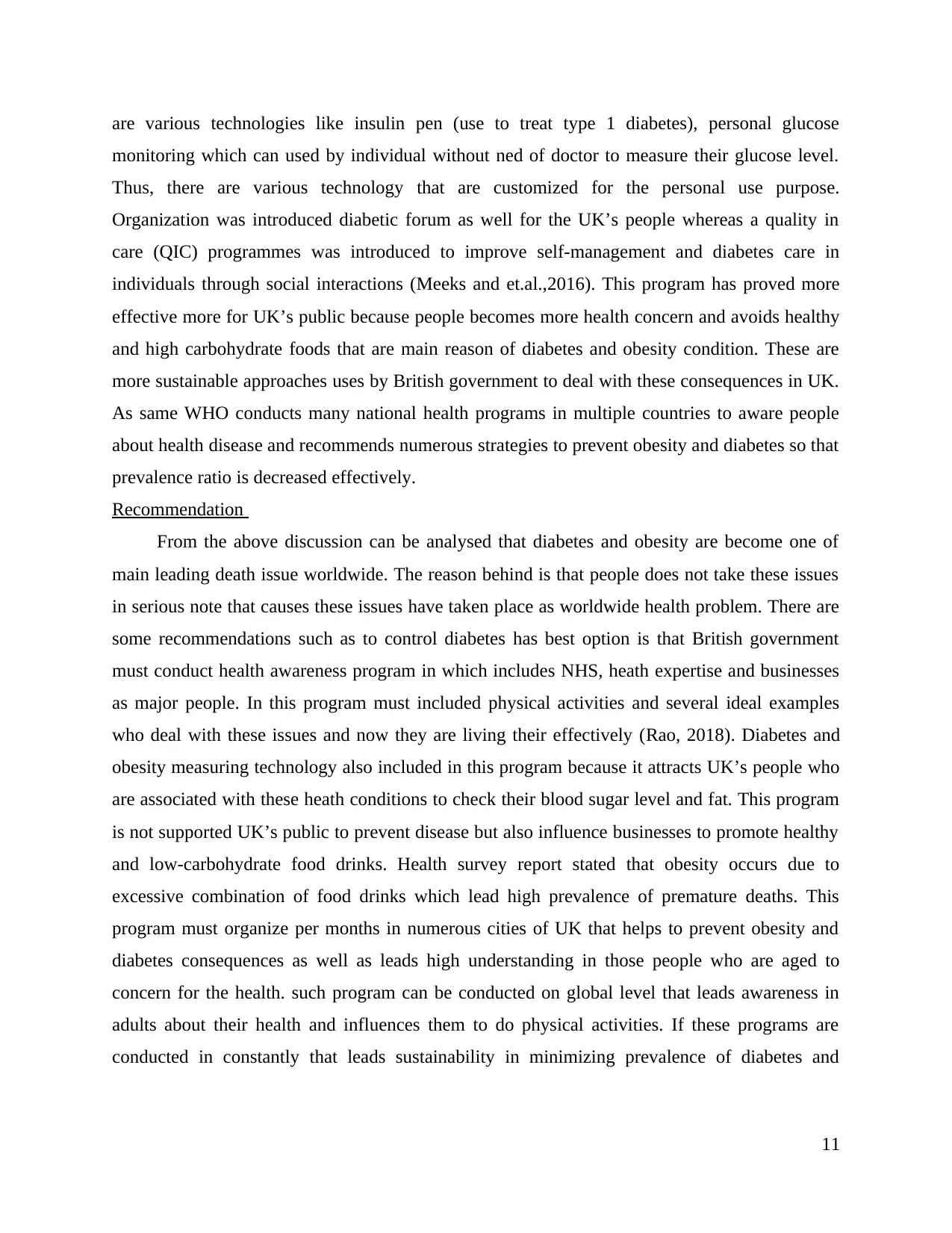
are various technologies like insulin pen (use to treat type 1 diabetes), personal glucose
monitoring which can used by individual without ned of doctor to measure their glucose level.
Thus, there are various technology that are customized for the personal use purpose.
Organization was introduced diabetic forum as well for the UK’s people whereas a quality in
care (QIC) programmes was introduced to improve self-management and diabetes care in
individuals through social interactions (Meeks and et.al.,2016). This program has proved more
effective more for UK’s public because people becomes more health concern and avoids healthy
and high carbohydrate foods that are main reason of diabetes and obesity condition. These are
more sustainable approaches uses by British government to deal with these consequences in UK.
As same WHO conducts many national health programs in multiple countries to aware people
about health disease and recommends numerous strategies to prevent obesity and diabetes so that
prevalence ratio is decreased effectively.
Recommendation
From the above discussion can be analysed that diabetes and obesity are become one of
main leading death issue worldwide. The reason behind is that people does not take these issues
in serious note that causes these issues have taken place as worldwide health problem. There are
some recommendations such as to control diabetes has best option is that British government
must conduct health awareness program in which includes NHS, heath expertise and businesses
as major people. In this program must included physical activities and several ideal examples
who deal with these issues and now they are living their effectively (Rao, 2018). Diabetes and
obesity measuring technology also included in this program because it attracts UK’s people who
are associated with these heath conditions to check their blood sugar level and fat. This program
is not supported UK’s public to prevent disease but also influence businesses to promote healthy
and low-carbohydrate food drinks. Health survey report stated that obesity occurs due to
excessive combination of food drinks which lead high prevalence of premature deaths. This
program must organize per months in numerous cities of UK that helps to prevent obesity and
diabetes consequences as well as leads high understanding in those people who are aged to
concern for the health. such program can be conducted on global level that leads awareness in
adults about their health and influences them to do physical activities. If these programs are
conducted in constantly that leads sustainability in minimizing prevalence of diabetes and
11
monitoring which can used by individual without ned of doctor to measure their glucose level.
Thus, there are various technology that are customized for the personal use purpose.
Organization was introduced diabetic forum as well for the UK’s people whereas a quality in
care (QIC) programmes was introduced to improve self-management and diabetes care in
individuals through social interactions (Meeks and et.al.,2016). This program has proved more
effective more for UK’s public because people becomes more health concern and avoids healthy
and high carbohydrate foods that are main reason of diabetes and obesity condition. These are
more sustainable approaches uses by British government to deal with these consequences in UK.
As same WHO conducts many national health programs in multiple countries to aware people
about health disease and recommends numerous strategies to prevent obesity and diabetes so that
prevalence ratio is decreased effectively.
Recommendation
From the above discussion can be analysed that diabetes and obesity are become one of
main leading death issue worldwide. The reason behind is that people does not take these issues
in serious note that causes these issues have taken place as worldwide health problem. There are
some recommendations such as to control diabetes has best option is that British government
must conduct health awareness program in which includes NHS, heath expertise and businesses
as major people. In this program must included physical activities and several ideal examples
who deal with these issues and now they are living their effectively (Rao, 2018). Diabetes and
obesity measuring technology also included in this program because it attracts UK’s people who
are associated with these heath conditions to check their blood sugar level and fat. This program
is not supported UK’s public to prevent disease but also influence businesses to promote healthy
and low-carbohydrate food drinks. Health survey report stated that obesity occurs due to
excessive combination of food drinks which lead high prevalence of premature deaths. This
program must organize per months in numerous cities of UK that helps to prevent obesity and
diabetes consequences as well as leads high understanding in those people who are aged to
concern for the health. such program can be conducted on global level that leads awareness in
adults about their health and influences them to do physical activities. If these programs are
conducted in constantly that leads sustainability in minimizing prevalence of diabetes and
11
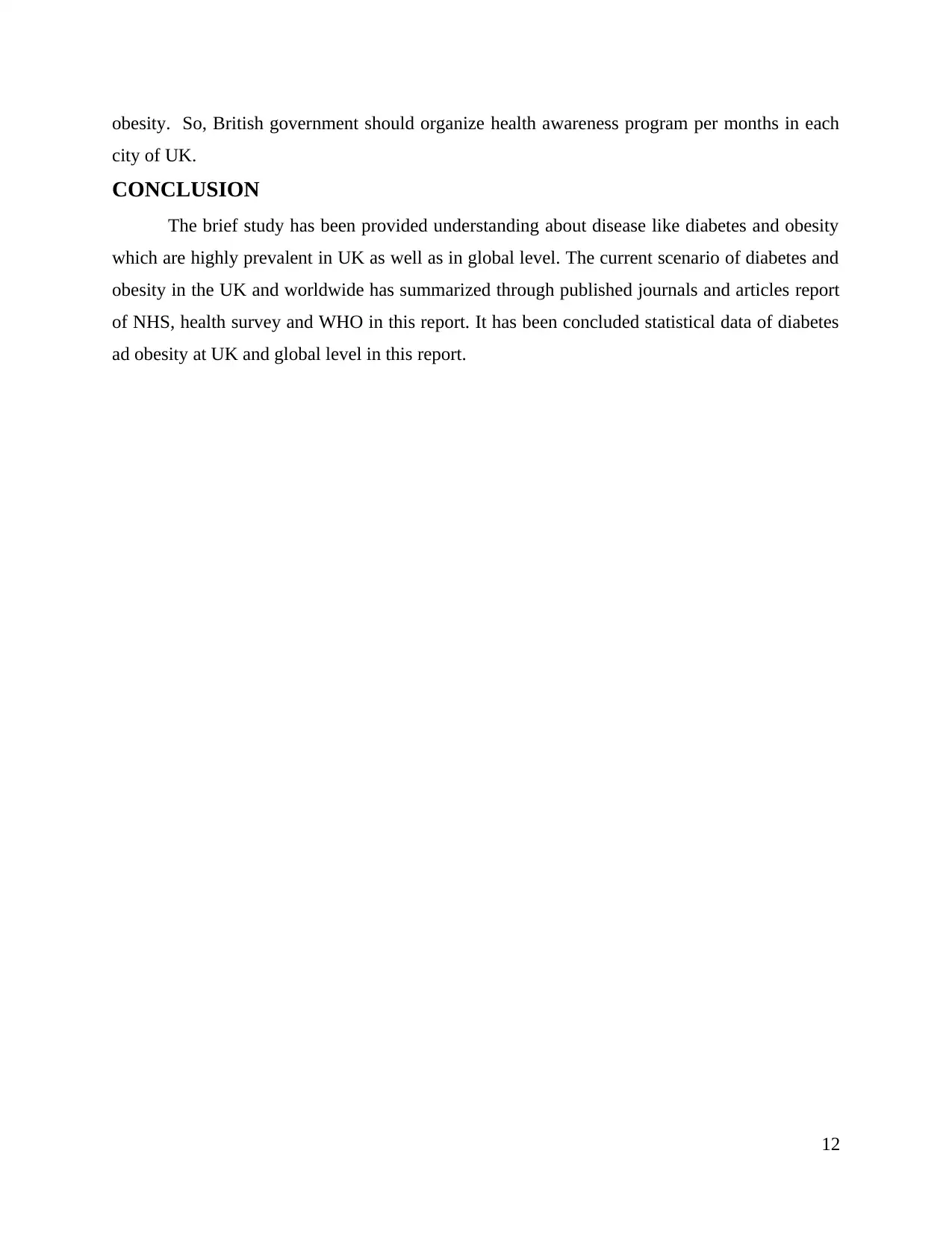
obesity. So, British government should organize health awareness program per months in each
city of UK.
CONCLUSION
The brief study has been provided understanding about disease like diabetes and obesity
which are highly prevalent in UK as well as in global level. The current scenario of diabetes and
obesity in the UK and worldwide has summarized through published journals and articles report
of NHS, health survey and WHO in this report. It has been concluded statistical data of diabetes
ad obesity at UK and global level in this report.
12
city of UK.
CONCLUSION
The brief study has been provided understanding about disease like diabetes and obesity
which are highly prevalent in UK as well as in global level. The current scenario of diabetes and
obesity in the UK and worldwide has summarized through published journals and articles report
of NHS, health survey and WHO in this report. It has been concluded statistical data of diabetes
ad obesity at UK and global level in this report.
12
⊘ This is a preview!⊘
Do you want full access?
Subscribe today to unlock all pages.

Trusted by 1+ million students worldwide
1 out of 14
Related Documents
Your All-in-One AI-Powered Toolkit for Academic Success.
+13062052269
info@desklib.com
Available 24*7 on WhatsApp / Email
![[object Object]](/_next/static/media/star-bottom.7253800d.svg)
Unlock your academic potential
Copyright © 2020–2026 A2Z Services. All Rights Reserved. Developed and managed by ZUCOL.





